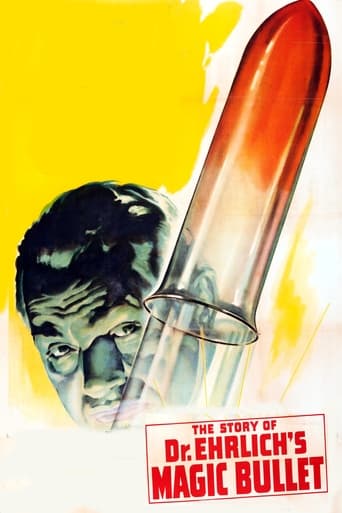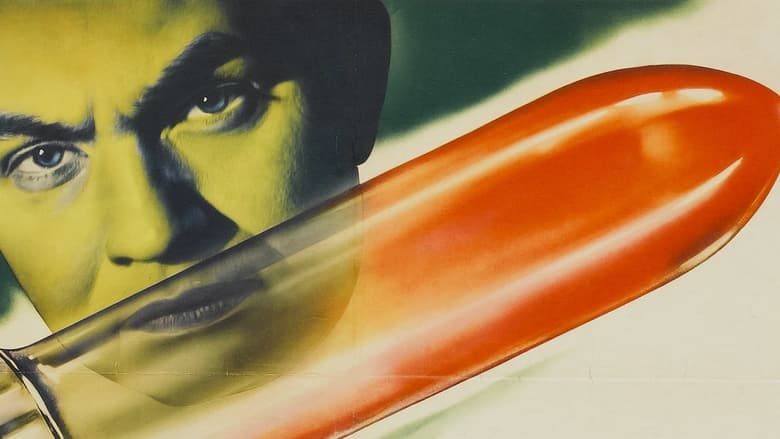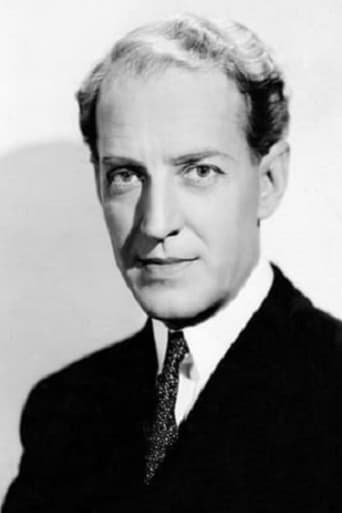Dr. Ehrlich's Magic Bullet (1940)
True story of the doctor who considered it was not immoral to search for a drug that would cure syphillis.
Watch Trailer
Free Trial Channels
Cast


Similar titles
Reviews
I like movies that are aware of what they are selling... without [any] greater aspirations than to make people laugh and that's it.
if their story seems completely bonkers, almost like a feverish work of fiction, you ain't heard nothing yet.
The best films of this genre always show a path and provide a takeaway for being a better person.
The film never slows down or bores, plunging from one harrowing sequence to the next.
Warner Brothers came up with a winner here. Taking a true story and giving it to Edward G. Robinson with a well written formula script works very well in this one.Robinson plays the man who actually developed a magic bullet cure for Syphilis. While the death scene at the end is pure Hollywood Hype, Robinson plays it well, and the rest of the film is a cut above many films.There are a lot of reasons this film is terrific, though we have now come a long ways from this miracle drug and even with more drugs developed, this one is not the total drug to cure it. HIV came along in the 1980's to recreate the times prior to this cure with a totally new disease mutation. This story is optimistic considering when it was made.Even though this is set in Nazi Germany, there is only one mention of the racism that was rampant under Hitler. They try to throw an Oriental man off the Lab staff. The Jewish issue is not given much attention in this one.At the time it seemed to be, but the second world war and the times really has made this great story a historic footnote. Watching Edward G Robinson in top form with a good script makes this movie well worth watching.
The thirties were a time when biopics were both common and popular. During this period they usually dealt with businessmen, politicians or scientists, all presented as industrious, inventive, heroic. Tyrone Power founded Lloyd's of London when he wasn't building the Suez Canal, for instance, Edward Arnold was Diamond Jim Brady, at least three actors were Abraham Lincoln, Edward G. Robinson founded Reuters and -- dare we say it? -- Orson Welles was William Randolph Hearst. Later they turned epic and their subjects broadened to include athletic icons, musicians, and artists, like "Lust for Life", and by the 60s they were far fewer but far truer. I'll mention "Lawrence of Arabia." In this 30s film, Robinson is Paul Ehrlich (1854 - 1915), a famous medical researcher whose curriculum vitae must run to dozens of pages covering dyes for microorganisms, the treatment of diphtheria, and finally the first cure for syphilis, called Salvarsan, which antedated the discovery of penicillin by years.These old biographies from the 30s are really enjoyable, even the Nazi propaganda film on Robert Koch, who practically founded bacteriology. Everything is slimmed down, gentrified, aimed at a working-class audience whose demands are low and who are satisfied with a cartoonish simplification of the subject's life. Ehrlich, for example, was responsible for the term "chemotherapy", mentioned only once because it has too many syllables, and for the "side chain theory" of immunization, mentioned once also but never explained. This particular film stands out for dealing openly with syphilis at a time when such things weren't referred to in polite company. Such social problems got the "Reefer Madness" treatment if they came up at all.Ehrlich has an argument mid-way through the film with his old friend and colleague Emil Behring. The conflict is obscure and the argument lasts about one minute before Behring deserts Ehrlich and leaves. Not until the end does Behring admit he'd been wrong -- and there is a tearful reconciliation. In historical reality, the two had cooperated in finding a treatment for diphtheria but Behring managed to sign the contract and make all the money, and took all the credit for the discovery. Adding insult to injury, Behring won the first Nobel Prize for Physiology or Medicine. (Ehrlich won the prize later.) But who cares? The disruption of their friendship and the reunion hug that followed is far more dramatically satisfying.William Dieterle was the director. He'd also directed "The Story of Louis Pasteur." (I'm telling you, there were a lot of biopics around.) Dieterle was a refugee from Nazi Germany and, in casting this film, he must have hired every German within a fifty mile radius of Hollywood. Even the secretary who blows her nose when Donald Meek pipes up was German. At least this cast guaranteed that the name "Ehrlich" is pronounced authentically -- it never comes out as "Erlick." Can I tack on another editorial comment? Throughout, we see Ehrlich and the others experimenting with mice and rabbits before trying their treatments out on human beings, including themselves. When you experiment on yourself it's called "self report," an established and accepted way of seeing what happens when one is exposed to an experimental substance. Sometimes it happens accidentally. In 1943, the Swiss chemist Albert Hoffman absorbed a minuscule amount of LSD through his fingertips and took the first acid trip. It kicked in while he was riding home on a bicycle. It must have been some bicycle ride.Sorry. Lost my train of thought while thinking about that bicycle. The point I wanted to make is that Ehrlich and the rest weren't really interested in mice and rabbits. They're just used because they're more convenient (and more legal) than human subjects. Some of us today are making the same mistake that the non-scientists in the movie make, complaining that too much money is spent on grants to study animals. But, again, the animals are just laboratory tools like scalpels. I don't know what geneticists would do without the fruit fly. Drosophila reproduce like crazy and make it possible to study patterns of inheritance without taking hundreds of years to do it.I should also add that when Ehrlich and Behring decide to treat ALL the children with diphtheria, not just half of them, it poses a neat question in biomedical ethics. It saved their bacon that every one of the twenty children recovered. If the results had been less definitive they'd have screwed up the experiment by eliminating the untreated children, called "the control group." But you don't always NEED a control group. If I can take ten monolingual English speakers and teach them to speak fluent French in two weeks, there's no need for controls. That, basically, is the kind of good luck that Erlich and Behring had in their diphtheria experiment.
If you've only seen Edward G. Robinson in gangster films, give this one a chance and see his range as an actor. Here he portrays German physician and researcher Paul Ehrlich, a pioneer at the turn of the 20th century in the treatment of infectious diseases and the man who found a cure for syphilis. Ehrlich starts out as a general practitioner employed by a hospital in order to provide a stable living for his family but whose real love is for research. His inquiring mind and nonconformist views ultimately makes him a leader in his field, but not before his pioneering ideas get him in trouble with the medical establishment in his country. Robinson has excellent support here with Ruth Gordon playing Ehrlich's adoring wife. Otto Kruger ably portrays Emil Adolf Von Behring, Ehrlich's friend and colleague who find himself at odds with his good friend's professional ideas at one point in their careers.The film was controversial at the time for mentioning the disease "syphilis" by name, and I'm sure a little bit of sensationalism is why Jack Warner thought that Dr. Ehrlich's biography would be good material for a film, but there's something more subtle going on here. Made in 1940, after the Nazi menace had been recognized by many but before America had been attacked, there are many not so subtle digs at Germany to be found here. Early in the film several of Ehrlich's colleagues are ratting him out to the head of the hospital for not following hospital rules. Specifically, Ehrlich realizes that the sweat baths prescribed as the treatment of syphilis at the time - 1890 - are of no value whatsoever. When a patient of Ehrlich's says that the baths sap his strength and may cost him his job, Ehrlich says that he can skip the baths. This humane act of deviating from a useless treatment is the "rule" Ehrlich has broken, and what gets him called on the carpet by the head of the hospital. The whole incident is one of several that make the Germans look rigid and inhumane. The issue of Ehrlich's colleagues doubting his abilities because of his religion - he was Jewish - also comes up a few times. Finally, when the state budget committee that is financing Ehrlich's lab comes by for an inspection they chastise Ehrlich for hiring a "non-German" doctor. It's very effective but subtle criticism of the Germans that Warner Brothers did so well in the years leading up to the war.One bone that Warner Brothers did have to throw to the censors because of the open discussion and showing of syphilis patients in various stages of the disease is that they could not show any female patients. They were only allowed to show male sufferers. I guess these guys all got this from "an inanimate object" as Dr. Ehrlich says is possible at one point in the film to downplay the sexual transmission angle of this disease. Wasn't the Breen era of the production code a scream?
I really love the old 1930s-40s Warner Brothers Biographical films and this is one of the best. Madame Curie, Emile Zola, Abraham Lincoln, Andrew Johnson, Mark Twain, Thomas Edison and others all come to life in these terrific, mostly black & white, films. Had this movie never been made I would never have heard of Dr. Paul Ehrlich, who led the way to find and defeat bacteria and micro-organisms. All of these geniuses had to overcome detractors who labelled them as quacks and lunatics. What gave them the gumption and tenacity to go on, even after failures? How did others trust them, support and finance them? Thank God for these people who fought to serve humanity. Edward G. Robinson is always good, but never more so as Dr. Ehrlich. A fine German-American supporting cast led by Otto Kruger, Sig Ruman and Albert Basserman add to the enjoyment as does a fine Max Steiner score. Director William Dieterle keeps the film moving along and it never gets slow or boring. The story starts with Ehrlich's discovery of staining slides so the bacteria and micro-organisms are better defined and diseases diagnosed, which leads to creation of vaccines. After finding a cure for diphtheria using inoculations, his colleagues still are skeptical and distrustful of him when he attempts to research man-made, chemical vaccines, which he calls "Magic Bullets". The film is so involving that I headed for Wikipedia to learn more about this fabulous genius. This is what movies do best!


















